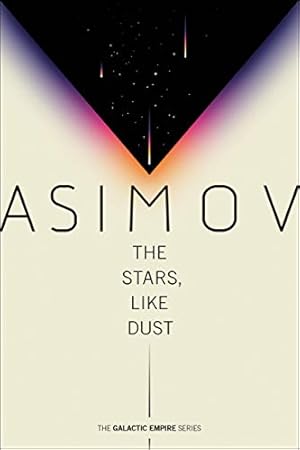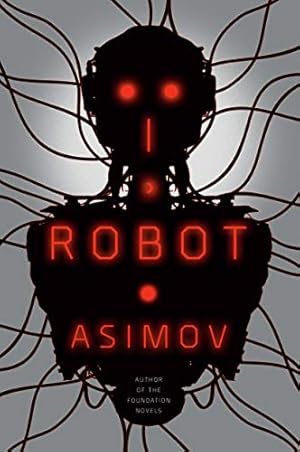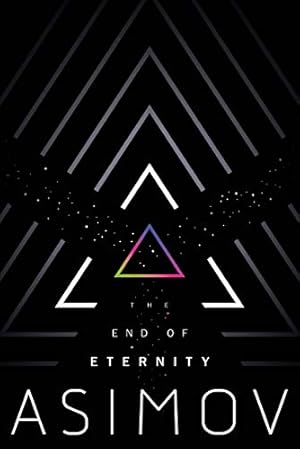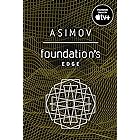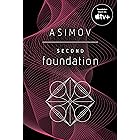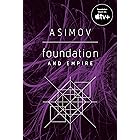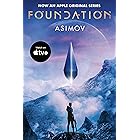These promotions will be applied to this item:
Some promotions may be combined; others are not eligible to be combined with other offers. For details, please see the Terms & Conditions associated with these promotions.
Your Memberships & Subscriptions

Download the free Kindle app and start reading Kindle books instantly on your smartphone, tablet, or computer - no Kindle device required.
Read instantly on your browser with Kindle for Web.
Using your mobile phone camera - scan the code below and download the Kindle app.



 Audible sample
Audible sample Foundation and Earth Kindle Edition
THE EPIC SAGA THAT INSPIRED THE APPLE TV+ SERIES FOUNDATION
Golan Trevize, former Councilman of the First Foundation, has chosen the future, and it is Gaia. A superorganism, Gaia is a holistic planet with a common consciousness so intensely united that every dewdrop, every pebble, every being, can speak for all—and feel for all. It is a realm in which privacy is not only undesirable, it is incomprehensible.
But is it the right choice for the destiny of mankind? While Trevize feels it is, that is not enough. He must know.
Trevize believes the answer lies at the site of humanity’s roots: fabled Earth . . . if it still exists. For no one is sure where the planet of Gaia’s first settlers is to be found in the immense wilderness of the Galaxy. Nor can anyone explain why no record of Earth has been preserved, no mention of it made anywhere in Gaia’s vast world-memory. It is an enigma Trevize is determined to resolve, and a quest he is determined to undertake, at any cost.
- LanguageEnglish
- PublisherDel Rey
- Publication dateFebruary 22, 2012
- File size14.4 MB
Shop this series
See full series- Kindle Price:$24.97By placing your order, you're purchasing a license to the content and you agree to the Kindle Store Terms of Use.
- Kindle Price:$59.93By placing your order, you're purchasing a license to the content and you agree to the Kindle Store Terms of Use.
Shop this series
This option includes 3 books.
This option includes 5 books.
This option includes 7 books.
Customers also bought or read
- Hyperion (Hyperion Cantos, Book 1)#1 Best SellerClassic Science Fiction eBooks
 Kindle Edition$3.99$3.99
Kindle Edition$3.99$3.99 - The Mercy of Gods (The Captive's War Book 1)#2 Most GiftedSpace Fleet Science Fiction
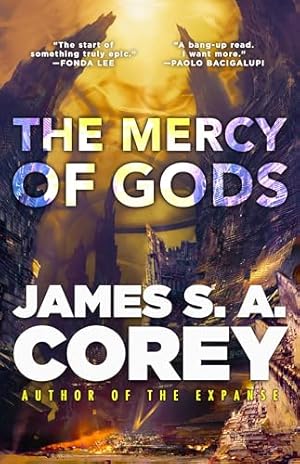 Kindle Edition$14.99$14.99
Kindle Edition$14.99$14.99 - We Are Legion (We Are Bob) (Bobiverse Book 1)#1 Most GiftedSpace Fleet Science Fiction
 Kindle Edition$3.95$3.95
Kindle Edition$3.95$3.95 - Ender's Game (Ender Quintet Book 1)#1 Most GiftedSpace Marine Science Fiction
 Kindle Edition$9.99$9.99
Kindle Edition$9.99$9.99
Customers who bought this item also bought
From the Publisher

Praise for the Foundation series




Foundation (Book 1)
|

Foundation and Empire (Book 2)
|

Second Foundation (Book 3)
|

Foundation’s Edge (Book 4)
|

Prelude to Foundation (Foundation Prequel 1)
|

Forward the Foundation (Foundation Prequel 2)
|
|
|---|---|---|---|---|---|---|
| Customer Reviews |
4.4 out of 5 stars 33,970
|
4.5 out of 5 stars 13,500
|
4.6 out of 5 stars 11,239
|
4.7 out of 5 stars 8,391
|
4.6 out of 5 stars 6,514
|
4.6 out of 5 stars 4,730
|
| Price | $7.99$7.99 | $8.99$8.99 | $7.99$7.99 | $8.99$8.99 | $8.99$8.99 | $7.99$7.99 |
| Experience the complete genre-defining Foundation series. | The story of our future begins with the Foundation. Nominated as one of America’s best-loved novels by PBS’s The Great American Read. | The second novel in Isaac Asimov’s classic science-fiction masterpiece, the Foundation series. | The third novel in Isaac Asimov’s classic science-fiction masterpiece, the Foundation series. | The fourth novel in Isaac Asimov’s classic science-fiction masterpiece, the Foundation series. | The first of two prequel novels in Isaac Asimov’s classic science-fiction masterpiece. | The second of two prequel novels in Isaac Asimov’s classic science-fiction masterpiece. |
Editorial Reviews
From Publishers Weekly
Copyright 1986 Reed Business Information, Inc.
From the Inside Flap
From the Back Cover
About the Author
Excerpt. © Reprinted by permission. All rights reserved.
THE SEARCH BEGINS
1.
"Why did I do it?" asked Golan Trevize.
It wasn't a new question. Since he had arrived at Gaia, he had asked it of himself frequently. He would wake up from a sound sleep in the pleasant coolness of the night and find the question sounding noiselessly in his mind, like a tiny drumbeat: Why did I do it? Why did I do it?
Now, though, for the first time, he managed to ask it of Dom, the ancient of Gaia.
Dom was well aware of Trevize's tension for he could sense the fabric of the Councilman's mind. He did not respond to it. Gaia must in no way ever touch Trevize's mind, and the best way of remaining immune to the temptation was to painstakingly ignore what he sensed.
"Do what, Trev?" he asked. He found it difficult to use more than one syllable in addressing a person, and it didn't matter. Trevize was growing somewhat used to that.
"The decision I made," said Trevize. "Choosing Gaia as the future."
"You were right to do so," said Dom, seated, his aged deep-set eyes looking earnestly up at the man of the Foundation, who was standing.
"You say I am right," said Trevize impatiently.
"I/we/Gaia know you are. That's your worth to us. You have the capacity for making the right decision on incomplete data, and you have made the decision. You chose Gaia! You rejected the anarchy of a Galactic Empire built on the technology of the First Foundation, as well as the anarchy of a Galactic Empire built on the mentalics of the Second Foundation. You decided that neither could be long stable. So you chose Gaia."
"Yes," said Trevize. "Exactly! I chose Gaia, a superorganism; a whole planet with a mind and personality in common, so that one has to say 'I/we/Gaia' as an invented pronoun to express the inexpressible." He paced the floor restlessly. "And it will become eventually Galaxia, a super-superorganism embracing all the swarm of the Milky Way."
He stopped, turned almost savagely on Dom, and said, "I feel I'm right, as you feel it, but you want the coming of Galaxia, and so are satisfied with the decision. There's something in me, however, that doesn't want it, and for that reason I'm not satisfied to accept the rightness so easily. I want to know why I made the decision, I want to weigh and judge the rightness and be satisfied with it. Merely feeling right isn't enough. How can I know I am right? What is the device that makes me right?"
"I/we/Gaia do not know how it is that you come to the right decision. Is it important to know that as long as we have the decision?"
"You speak for the whole planet, do you? For the common consciousness of every dewdrop, of every pebble, of even the liquid central core of the planet?"
"I do, and so can any portion of the planet in which the intensity of the common consciousness is great enough."
"And is all this common consciousness satisfied to use me as a black box? Since the black box works, is it unimportant to know what is inside? --That doesn't suit me. I don't enjoy being a black box. I want to know what's inside. I want to know how and why I chose Gaia and Galaxia as the future, so that I can rest and be at peace."
"But why do you dislike or distrust your decision so?"
Trevize drew a deep breath and said slowly, in a low and forceful voice, "Because I don't want to be part of a superorganism. I don't want to be a dispensable part to be done away with whenever the superorganism judges that doing away would be for the good of the whole."
Dom looked at Trevize thoughtfully. "Do you want to change your decision, then, Trev? You can, you know."
"I long to change the decision, but I can't do that merely because I dislike it. To do something now, I have to know whether the decision is wrong or right. It's not enough merely to feel it's right."
"If you feel you are right, you are right." Always that slow, gentle voice that somehow made Trevize feel wilder by its very contrast with his own inner turmoil.
Then Trevize said, in half a whisper, breaking out of the insoluble oscillation between feeling and knowing, "I must find Earth."
"Because it has something to do with this passionate need of yours to know?"
"Because it is another problem that troubles me unbearably and because I feel there is a connection between the two. Am I not a black box? I feel there is a connection. Isn't that enough to make you accept it as a fact?"
"Perhaps," said Dom, with equanimity.
"Granted it is now thousands of years--twenty thousand perhaps--since the people of the Galaxy have concerned themselves with Earth, how is it possible that we have all forgotten our planet of origin?"
"Twenty thousand years is a longer time than you realize. There are many aspects of the early Empire we know little of; many legends that are almost surely fictitious but that we keep repeating, and even believing, because of lack of anything to substitute. And Earth is older than the Empire."
"But surely there are some records. My good friend, Pelorat, collects myths and legends of early Earth; anything he can scrape up from any source. It is his profession and, more important, his hobby. Those myths and legends are all there are. There are no actual records, no documents."
"Documents twenty thousand years old? Things decay, perish, are destroyed through inefficiency or war."
"But there should be records of the records; copies, copies of the copies, and copies of the copies of the copies; useful material much younger than twenty millennia. They have been removed. The Galactic Library at Trantor must have had documents concerning Earth. Those documents are referred to in known historical records, but the documents no longer exist in the Galactic Library. The references to them may exist, but any quotations from them do not exist."
"Remember that Trantor was sacked a few centuries ago."
"The Library was left untouched. It was protected by the personnel of the Second Foundation. And it was those personnel who recently discovered that material related to Earth no longer exists. The material was deliberately removed in recent times. Why?" Trevize ceased his pacing and looked intently at Dom. "If I find Earth, I will find out what it is hiding--"
"Hiding?"
"Hiding or being hidden. Once I find that out, I have the feeling I will know why I have chosen Gaia and Galaxia over our individuality. Then, I presume, I will know, not feel, that I am correct, and if I am correct"--he lifted his shoulders hopelessly--"then so be it."
"If you feel that is so," said Dom, "and if you feel you must hunt for Earth, then, of course, we will help you do as much as we can. That help, however, is limited. For instance, I/we/Gaia do not know where Earth may be located among the immense wilderness of worlds that make up the Galaxy."
"Even so," said Trevize, "I must search. --Even if the endless powdering of stars in the Galaxy makes the quest seem hopeless, and even if I must do it alone."
2.
Trevize was surrounded by the tameness of Gaia. The temperature, as always, was comfortable, and the air moved pleasantly, refreshing but not chilling. Clouds drifted across the sky, interrupting the sunlight now and then, and, no doubt, if the water vapor level per meter of open land surface dropped sufficiently in this place or that, there would be enough rain to restore it.
The trees grew in regular spacings, like an orchard, and did so, no doubt, all over the world. The land and sea were stocked with plant and animal life in proper numbers and in the proper variety to provide an appropriate ecological balance, and all of them, no doubt, increased and decreased in numbers in a slow sway about the recognized optimum. --As did the number of human beings, too.
Of all the objects within the purview of Trevize's vision, the only wild card in the deck was his ship, the Far Star.
The ship had been cleaned and refurbished efficiently and well by a number of the human components of Gaia. It had been restocked with food and drink, its furnishings had been renewed or replaced, its mechanical workings rechecked. Trevize himself had checked the ship's computer carefully.
Nor did the ship need refueling, for it was one of the few gravitic ships of the Foundation, running on the energy of the general gravitational field of the Galaxy, and that was enough to supply all the possible fleets of humanity for all the eons of their likely existence without measurable decrease of intensity.
Three months ago, Trevize had been a Councilman of Terminus. He had, in other words, been a member of the Legislature of the Foundation and, ex officio, a great one of the Galaxy. Was it only three months ago? It seemed it was half his thirty-two-year-old lifetime since that had been his post and his only concern had been whether the great Seldon Plan had been valid or not; whether the smooth rise of the Foundation from planetary village to Galactic greatness had been properly charted in advance, or not.
Yet in some ways, there was no change. He was still a Councilman. His status and his privileges remained unchanged, except that he didn't expect he would ever return to Terminus to claim that status and those privileges. He would no more fit into the huge chaos of the Foundation than into the small orderliness of Gaia. He was at home nowhere, an orphan everywhere.
His jaw tightened and he pushed his fingers angrily through his black hair. Before he wasted time bemoaning his fate, he must find Earth. If he survived the search, there would then be time enough to sit down and weep. He might have even better reason then.
With determined stolidity, then, he thought back--
Three months before, he and Janov Pelorat, that able, naive scholar, had left Terminus. Pelorat had been driven by his antiquarian enthusiasms to discover the site of long-lost Earth, and Trevize had gone along, using Pelorat's goal as a cover for what he thought his own real aim was. They did not find Earth, but they did find Gaia, and Trevize had then found himself forced to make his fateful decision.
Now it was he, Trevize, who had turned half-circle--about-face--and was searching for Earth.
As for Pelorat, he, too, had found something he didn't expect. He had found the black-haired, dark-eyed Bliss, the young woman who was Gaia, even as Dom was--and as the nearest grain of sand or blade of grass was. Pelorat, with the peculiar ardor of late middle age, had fallen in love with a woman less than half his years, and the young woman, oddly enough, seemed content with that.
It was odd--but Pelorat was surely happy and Trevize thought resignedly that each person must find happiness in his or her own manner. That was the point of individuality--the individuality that Trevize, by his choice, was abolishing (given time) over all the Galaxy.
The pain returned. That decision he had made, and had had to make, continued to excoriate him at every moment and was--
"Golan!"
The voice intruded on Trevize's thoughts and he looked up in the direction of the sun, blinking his eyes.
"Ah, Janov," he said heartily--the more heartily because he did not want Pelorat guessing at the sourness of his thoughts. He even managed a jovial, "You've managed to tear yourself away from Bliss, I see."
Pelorat shook his head. The gentle breeze stirred his silky white hair, and his long solemn face retained its length and solemnity in full. "Actually, old chap, it was she that suggested I see you--about--about what I want to discuss. Not that I wouldn't have wanted to see you on my own, of course, but she seems to think more quickly than I do."
Trevize smiled. "It's all right, Janov. You're here to say good-bye, I take it."
"Well, no, not exactly. In fact, more nearly the reverse. Golan, when we left Terminus, you and I, I was intent on finding Earth. I've spent virtually my entire adult life at that task."
"And I will carry on, Janov. The task is mine now."
"Yes, but it's mine, also; mine, still."
"But--" Trevize lifted an arm in a vague all-inclusive gesture of the world about them.
Pelorat said, in a sudden urgent gasp, "I want to go with you."
Trevize felt astonished. "You can't mean that, Janov. You have Gaia now."
"I'll come back to Gaia someday, but I cannot let you go alone."
"Certainly you can. I can take care of myself."
"No offense, Golan, but you don't know enough. It is I who know the myths and legends. I can direct you."
"And you'll leave Bliss? Come, now."
A faint pink colored Pelorat's cheeks. "I don't exactly want to do that, old chap, but she said--"
Trevize frowned. "Is it that she's trying to get rid of you, Janov? She promised me--"
"No, you don't understand. Please listen to me, Golan. You do have this uncomfortable explosive way of jumping to conclusions before you hear one out. It's your specialty, I know, and I seem to have a certain difficulty in expressing myself concisely, but--"
"Well," said Trevize gently, "suppose you tell me exactly what it is that Bliss has on her mind in just any way you please, and I promise to be very patient."
"Thank you, and as long as you're going to be patient, I think I can come out with it right away. You see, Bliss wants to come, too."
"Bliss wants to come?" said Trevize. "No, I'm exploding again. I won't explode. Tell me, Janov, why would Bliss want to come along? I'm asking it quietly."
"She didn't say. She said she wants to talk to you."
"Then why isn't she here, eh?"
Pelorat said, "I think--I say I think--that she is rather of the opinion that you are not fond of her, Golan, and she rather hesitates to approach you. I have done my best, old man, to assure her that you have nothing against her. I cannot believe anyone would think anything but highly of her. Still, she wanted me to broach the subject with you, so to speak. May I tell her that you'll be willing to see her, Golan?"
"Of course, I'll see her right now."
"And you'll be reasonable? You see, old man, she's rather intense about it. She said the matter was vital and she must go with you."
Product details
- ASIN : B003EY7IHM
- Publisher : Del Rey
- Accessibility : Learn more
- Publication date : February 22, 2012
- Language : English
- File size : 14.4 MB
- Screen Reader : Supported
- Enhanced typesetting : Enabled
- X-Ray : Enabled
- Word Wise : Enabled
- Print length : 423 pages
- ISBN-13 : 978-0553900941
- Page Flip : Enabled
- Lexile measure : 890
- Book 5 of 7 : Foundation
- Best Sellers Rank: #45,767 in Kindle Store (See Top 100 in Kindle Store)
- #13 in Classic Science Fiction eBooks
- #123 in Hard Science Fiction (Books)
- #181 in Hard Science Fiction (Kindle Store)
- Customer Reviews:
About the author

Isaac Asimov (/ˈaɪzᵻk ˈæzᵻmɒv/; born Isaak Yudovich Ozimov; circa January 2, 1920 – April 6, 1992) was an American author and professor of biochemistry at Boston University, best known for his works of science fiction and for his popular science books. Asimov was prolific and wrote or edited more than 500 books and an estimated 90,000 letters and postcards. His books have been published in 9 of the 10 major categories of the Dewey Decimal Classification.
Asimov wrote hard science fiction and, along with Robert A. Heinlein and Arthur C. Clarke, he was considered one of the "Big Three" science fiction writers during his lifetime. Asimov's most famous work is the Foundation Series; his other major series are the Galactic Empire series and the Robot series. The Galactic Empire novels are explicitly set in earlier history of the same fictional universe as the Foundation series. Later, beginning with Foundation's Edge, he linked this distant future to the Robot and Spacer stories, creating a unified "future history" for his stories much like those pioneered by Robert A. Heinlein and previously produced by Cordwainer Smith and Poul Anderson. He wrote hundreds of short stories, including the social science fiction "Nightfall", which in 1964 was voted by the Science Fiction Writers of America the best short science fiction story of all time. Asimov wrote the Lucky Starr series of juvenile science-fiction novels using the pen name Paul French.
Asimov also wrote mysteries and fantasy, as well as much nonfiction. Most of his popular science books explain scientific concepts in a historical way, going as far back as possible to a time when the science in question was at its simplest stage. He often provides nationalities, birth dates, and death dates for the scientists he mentions, as well as etymologies and pronunciation guides for technical terms. Examples include Guide to Science, the three-volume set Understanding Physics, and Asimov's Chronology of Science and Discovery, as well as works on astronomy, mathematics, history, William Shakespeare's writing, and chemistry.
Asimov was a long-time member and vice president of Mensa International, albeit reluctantly; he described some members of that organization as "brain-proud and aggressive about their IQs". He took more joy in being president of the American Humanist Association. The asteroid 5020 Asimov, a crater on the planet Mars, a Brooklyn elementary school, and a literary award are named in his honor.
Bio from Wikipedia, the free encyclopedia. Photo by Phillip Leonian from New York World-Telegram & Sun [Public domain], via Wikimedia Commons.
Customer reviews
Customer Reviews, including Product Star Ratings help customers to learn more about the product and decide whether it is the right product for them.
To calculate the overall star rating and percentage breakdown by star, we don’t use a simple average. Instead, our system considers things like how recent a review is and if the reviewer bought the item on Amazon. It also analyzed reviews to verify trustworthiness.
Learn more how customers reviews work on AmazonCustomers say
Customers find this book to be a fantastic conclusion to the Foundation series, praising its fast-paced epic vision of the far future and considering it one of the greatest classic sci-fi works ever written. The book receives positive feedback for its readability, with one customer noting it gets better with each reading, and customers appreciate its entertainment value, with one describing it as an "incredibly enjoyable blast from the past." The character development receives mixed reviews, with some customers appreciating it while others express little regard for the characters.
AI-generated from the text of customer reviews
Customers appreciate the story length of the book, describing it as an epic and unexpected conclusion to the Foundation saga with a suspenseful plot.
"...close the saga of the First and Second Foundations, with a great twist while leaving open the door to future expansion and exploration...." Read more
"...Either way the story is still alive in my mind and all of the characters I’ve loved and loathed will be a part of me forever...." Read more
"...It's a fair ending to a long series, closing many loops in the story, yet bringing a few new things to bring things into conclusion" Read more
"...between Pelorat and Trevise are excruciatingly long and do not add to the storyline, except sometimes to provide some "science-teaching" in the form..." Read more
Customers find the book well written and a true pleasure to read, with several mentioning that the first three books were fantastic.
"...It's a very satisfying book to read." Read more
"...Incomparable. Foundation's Edge held it's own; worth the wait. This book, no mistaking it, is still the work of a master...." Read more
"The book is entertaining and a good read, a worthy companion to the rest of the Foundation series. I am sure that most Asimov fans will love it...." Read more
"...But it is a nice read." Read more
Customers find the book engaging and thought-provoking, with one customer noting it can be an all-absorbing thesis.
"...fast paced making it difficult to put this book down and it stretches the imagination more than any of the previous books...." Read more
"...In summary, Dr. Asimov gives us very entertaining stories interspersed with thought provoking philosophy and sophisticated scientific references...." Read more
"...The whole series: I thoroughly enjoyed the Robot series, but I had to push through some of the Empire books (Pebble in the Sky)...." Read more
"Love to read the Asimov books. Favorite genre solely due to this writer...." Read more
Customers praise this book as a fantastic conclusion to the Foundation series, with one customer noting it's a great sequel to Foundation and Empire.
"...The result is a very satisfying conclusion the the Foundation series. ***..." Read more
"...Probably the first or second best in the series...." Read more
"The book is entertaining and a good read, a worthy companion to the rest of the Foundation series. I am sure that most Asimov fans will love it...." Read more
"I’ve enjoyed the Foundation saga and this is a great ending to Books 4 and 5. Ties into other Asimov books as well." Read more
Customers praise this science fiction book as one of the greatest classics ever written by Isaac Asimov, with one customer noting it's not too full of sci-fi babble.
"...the first science fiction books I read and I rank them all as great works of sci-fi...." Read more
"...Asimov weaves astronomy, historical interpretations, biology and other topics within their search." Read more
"...the historic seven-book Foundation series by Isaac Asimov, maybe the greatest writer of his generation...." Read more
"...The novel itself is an excellent example of the high quality science fiction created by one of the 'fathers of science fiction' Isaac Asimov...." Read more
Customers appreciate the pacing of the book, praising its epic vision of the far future and fast-paced narrative.
"...The story is very fast paced making it difficult to put this book down and it stretches the imagination more than any of the previous books...." Read more
"...This book, no mistaking it, is still the work of a master. But two quibbles knock off a star for this reader...." Read more
"...galactic empire that encompasses all his earlier works into a seamless timeline...." Read more
"...not a lot of characterization or direction, and overall bad pacing and motivation. There just wasn't much of a story here...." Read more
Customers have mixed opinions about the character development in the book, with some appreciating it while others express little regard for the characters.
"...The character of Pelorat also becomes irritating. He always apologies for not having full mastery of the ancient Galactic language...." Read more
"...Having said that, it is a well written story with believable characters and it is far from being the social parody that Swifts book was." Read more
"...I feel like there were some interesting ideas, but the characters were flat and their motivations were often kind of contrived..." Read more
"Liked: Thought-provoking and suspenseful plot, interesting and appealing characters, creative and convincing world-building, links to Robot..." Read more
Customers find the writing style of the book boring, repetitive, and tedious.
"...The interaction between Trevise and Bliss is redundant - they argue about every person, every animal, every bite of food, every reaction... One..." Read more
"...First of all there are too many pages of recurring philosophical arguments on the pros and cons if individuality vs group consciousness...." Read more
"...This leads to many conversations, all regarding virtually the same topic...." Read more
"...The dialog is so tedious and repetitive that I found myself hating the characters and skipping any dialog that was obviously going to be a repeat of..." Read more
Reviews with images
Beautiful edition
Top reviews from the United States
There was a problem filtering reviews. Please reload the page.
- Reviewed in the United States on January 2, 2025Item was as described and arrived as promised.
- Reviewed in the United States on June 1, 2006Golan Trevize looks for Earth. The novel picks up right after the end of Foundation's Edge. I found Foundation's Edge slightly confusing in that there was something effecting the minds of both the Foundation confederation and the minds of the Second Foundation, and wasn't completely sure if it was a Third Foundation or what. Foundation and Earth clears that up, well sort of. It is not a Hari Seldon originated organization, it is the planet Gaia, but calling it a Third Foundation could be used if you redefine The Foundation. It is hinted that there may be yet *another* group effecting events in the galaxy; the equivalent of a Fourth Foundation... or maybe a Zeroth Foundation. This is one of the slight, but exasperating aspects of this novel. In the Author's Note of Prelude to Foundation, Asimov wrote that he could and may add to the Foundation series and as for books after Foundation and Earth he could add "additional volumes - as many as I like"). In parts it feels like that, that Asimov is setting himself for additional volumes, rather than this being the definitive end to the Foundation series, as it now is. Another thing is that Asimov groups his Robot, Empire, and Foundation series in one all encompassing series. For whatever contradictions exist between the series, Asimov gives preference to his Robot series.
Foundation and Earth takes us on a tour of seven different planets and the different habitations of each. Some have gone to the dogs, some are autocratic, and there's excitement on each one. Asimov has set up the galaxy in that are no other known intelligent non-human (or human-made) species. Sort of answers the famous questions on the lack of evidence of extraterrestrial intelligence: "where is everybody?". Well, Asimov's answer is: there isn't anybody else... well kinda, sorta... If you read the book you'll understand. Actually, even though there are these ambiguities on the universe here and there, Asimov does wrap up the Foundation series somewhat nicely (although you may not like it as it differs from the original Foundation series), as well as wrapping up his grouping of all of his series into one.
- Reviewed in the United States on July 4, 2012Foundation and Earth picks up right where Foundation's Edge left of as Trevize, Perolat and Bliss continue their search for Earth. The entire story-line includes the famous wit found in all Asimov's novels but seems to pack in even more intrigue than normal as it slowly becomes clear that something even greater than the Seldon plan may be at play. The story is very fast paced making it difficult to put this book down and it stretches the imagination more than any of the previous books. Asimov uses this final book to tie in both the Robot series and the Foundation series as well as clear up many other questions left open in his prior novels. The result is a very satisfying conclusion the the Foundation series.
***
For those new to the series, here are the specific seven books tied directly into the Foundation story line and their original date of publication. I read these in the order they were published and was very happy to have chosen that order. Asimov also tied in some of this other book series into this one (specifically his Robot series) thus making the entire story line a much larger volume of books.
Prelude to Foundation (1988)
Forward the Foundation (1993)
Foundation (1951)
Foundation and Empire (1952)
Second Foundation (1953)
Foundation's Edge (1982)
Foundation and Earth (1986)
- Reviewed in the United States on January 4, 2017Science fiction literature has been part of my reading since my early teens. My earliest readings contained, by today's standards, relatively tame sexual interludes and of course assured my continued reading. Sexuality in this example of Asimov's writing is really quite tame, but would have kept the 14 year old me entranced. The adult me is impressed with the mature sexual attitudes taken in this story.
Beyond all that Asimov provokes mature conjecture about humanity and profound philosophical conjectures about broad questions, not only of human governance, but also human interactions across different worlds and cultures. This book like many of his benefits from Dr. Asimov's excellent education and his being present at the cutting edges of physics and science during some of its most profound advances. He refers to things like the uncertainty principle in an off hand way that does require a bit from the reader.
In summary, Dr. Asimov gives us very entertaining stories interspersed with thought provoking philosophy and sophisticated scientific references. It's a very satisfying book to read.
- Reviewed in the United States on November 5, 2012It's hard for me to review an Asimov work without the overuse of superlatives. Isaac Asimov's Foundation and Earth is part of the Foundation series, which are among the first science fiction books I read and I rank them all as great works of sci-fi. Asimov brings to an astounding close the saga of the First and Second Foundations, with a great twist while leaving open the door to future expansion and exploration. He paints for the reader an excellent picture of how vast the universe is and how human civilization might appear after 12,000 years of space travel and colonization. Despite the incredible reach attained by man during that time, there are still mysteries and unexplored corners of the "civilized" galaxy, let alone the myriad galaxies beyond ours. Once you start this series, you will not want to put it down until you reach the conclusion, then you will want to go out and get Asimov's other works.
Top reviews from other countries
-
 Silvano AndrésReviewed in Mexico on May 21, 2025
Silvano AndrésReviewed in Mexico on May 21, 20255.0 out of 5 stars Ciencia... ¿Ficción?
Lo cierto es que Isaac Asimov desarrolló muchos conceptos de este género, de ahí han bebido otras historias, indudablemente.
-
 Francisco FelixReviewed in Brazil on August 27, 2023
Francisco FelixReviewed in Brazil on August 27, 20235.0 out of 5 stars Nada realmente termina
Ao final da leitura dos cinco livros canônicos de Fundação, é possível avaliar as mudanças que ocorreram no estilo de Asimov ao longo de décadas. Essa série resume, de certa forma, o autor, é como se cada personagem fosse, na realidade, uma parte dele ou uma mensagem que ele deixa. Asimov acaba escolhendo enfim uma utopia panpsiquista e vagamente socialista, mas será que ele realmente desejava algo assim para a humanidade? Ou ele achava que será um dos prováveis desenvolvimentos possíveis dos seres humanos? Além disso, o último livro da série soa incrivelmente moderno, apesar de suas idiossincrasias sociais herdadas da sociedade dos anos 50 a 80 (o último livro da série foi publicado a quase 40 anos!). Hoje, em 2023, se fala tanto sobre o "paradoxo" de Fermi, e Asimov parecia antever isso e muito daquilo que se descobriu recentemente (guardados os descontos pela absoluta falta de conhecimento sobre isso naquela época). Asimov parece ter sido um defensor, ao menos nessa sua obra, da hipótese de uma Terra rara, porém possivelmente não única. E, no final de tudo, outro início. Nada termina, realmente.
 VasilyReviewed in Germany on January 12, 2025
VasilyReviewed in Germany on January 12, 20255.0 out of 5 stars Great classic read
This edition is very good. Comfortable size and good quality.
 Peter HughesReviewed in Australia on December 27, 2023
Peter HughesReviewed in Australia on December 27, 20234.0 out of 5 stars Great finish to THE GREATEST science fiction series in history
Having read a lot of science fiction over 40 years The Foundation Series is clearly still the best imo and this last concluding novel is a fitting and satisfying finale.
This last novel is not without flaws, however. Chief of which are 2 main characters becoming a touch annoying at times. Azimoz turns Bliss into an impractical and naive dummy at times and Trevise is a touch argumentative to begin with. Both characters come good in the end of course.
Azimov takes his time moving to the finale but people can easy flip through some slower parts if they wish. The diversions to 3 other Spacer planets turn out to be essential to the narrative. Foundation and Earth should only be read after people have read all the preceding books in this series.
 Wall-eReviewed in India on May 1, 2024
Wall-eReviewed in India on May 1, 20245.0 out of 5 stars Great copy.. love it
Pay attention to the publisher and seller with these hardcovers. I haven't had the chance to get my hands on these in years since these are rare prints and pretty much impossible to find in India.
I was able find atleast three or four copies of Asimov's books and every one of them was a beauty.
This is chronologically the last piece of Asimov's books.. kind of ties up all the ends and gives a closure to his original android.. R Daneel. The usual bland story telling of Asimov's which means nothing to fans!
Print is amazing.. imported copy per the inside detail and new book as promised. Packed neat and untouched. Love it.
Thanks to the seller and Amazon. Recommend the seller more!














